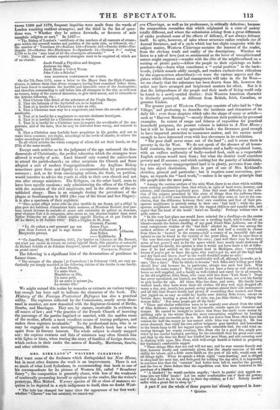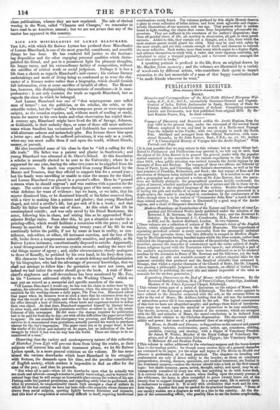MRS. KIRK LAND'S * WESTERN CLEARINGS MALT want some of the
freshness which distinguished her New Home, but in most other features the work is an improvement. There is not so much of what Lord Sydenham, in recommending that book to one of his correspondents for its picture of Western life, called "Broadway finery"; the composition is generally closer, with less of the weakness of continually presenting herself or opinions to the reader, like the writer's prototype, Miss Mitford. If every species of life or class of manners re- quires to be depicted in a style indigenous to itself, then no doubt West- • The lady has changed her name since the appearance of her first work: whether" Clavers" was but assumed, we cannot say. ern Clearings, as well as its predecessor, is critically defective; because the composition resembles that which originated in a state of society totally different, and where the submission arising from a great difference of ranks produced some of the effects of delicacy, if not always delicacy itself. In spite, however, of tales whose structure rather reminds one of Annual literature and of a style which has but slight congruity with the subject matter, literature, Clearings sustains the interest of the reader,
from the obvious truth and reality of the descriptions. Whether we listen to a tale of love (not so sentimental as the lover of unsophisticated nature might suppose)—wander with the elite of the neighbourhood on a nutting or picnic party—follow the people to their rejoicings on Inde- pendence-day—learn what constitutes a " social position " in the back- woods, (which sounds oddly enough, and renders exclusiveism ridiculous
by the argumentum asurdum)—or trace the various aspects and dis- guises which idleness and bad management will take in the far West--
we see clearly that the substance has been drawn front life, however the artist may have arranged and heightened matters for effect. Nor is it that the independence of the people and their mode of living could only be found in a newly-settled district : their Western American character is distinctly portrayed, as different from British, Irish, Canadian, or genuine Yankee.
The greater part of Western Clearings consists of tales laid in " One Village," and professing to describe the incidents and characters of its daily life : even those chapters which take the shape of essay or article—
such as "Harvest Musings "—mostly illustrate their positions by personal examples. In extent of range and fulness of exposition for practical
household purposes, the present volume is inferior to A New Home • but it will be found a very agreeable book ; the literature good enough to have imparted attraction to commoner matter, and the matter novel enough to have interested even with less cleverness in its exhibition.
"The poor shall never cease out of the land " ; and it seems there is poverty in the far West. We do not speak of the absence of all house- hold comforts, the presence of slatterliness and a badly-regulated home, with an endless uniformity of badly-cooked food, such as a respectable English artisan would turn from; but what the district itself considers poverty and ill success; and which nothing but the paucity of inhabitants, in a country where unappropriated land is in plenty, prevents from sink- ing into abject destitution. Here is part of one of Mrs. Kirkland's sketches, general and particular : but it requires some correction per- haps, as regards the "hard work,"—unless it be upon the principle that idle people take the most pains.
"Among the various settlers of the wide West, there is no class which exhibits more striking peculiarities than that which, in spite of hard work, honesty, and sobriety' still continues hopelessly poor. None find more difficulty in the solu-
tion of the enigma presented by this state of things than the sufferers them- selves; and it is with some bitterness of spirit that they come at last to the con- clusion, that the difference between their own condition and that of their pro- sperous neighbours is entirely owing to their own bad luck '; while the pro- sperous neighbours look musingly at the ragged children and squalid wife, and regret that the head of the house lia'n't no facility.' Perhaps neither view is quite correct. "In the very last place one would have selected for a dwelling—in the centre of a wide expanse of low, marshy land—on a swelling knoll, which looks like an island—stands the forlorn dwelling of my good friend Silas Ashburn, one of the
most conspicuous victims of the bad luck' alluded to. Silas was among the earliest settlers of our part of the country, and had half a county to choose
from when he located' in the swamp—half a county of as beautiful dale and upland as can be found in the vicinity of the great lakes. But he says there is
the very first-rate of pasturing' for MS cows; (and well there may be on forty acres of wet grass!) and as for the agues which have nearly made skeletons of himself and his family, his opinion is that it would not have made a bit of differ- ence if he had settled on the highest land in Michigan, since everybody knows if you've got to have the ague, why you've got to, and all the high land and dry land and Queen Ann' in the world wouldn't make no odds.'
"Silas does not get rich, nor even comfortably well off, although he works, as h
says 'like a tiger.' This he thinks is because rich folks ain't willing poor folks should live,' and because he, in particular, always has such bad lack. Why shouldn't he make money ? Why should he not have a farm as well stocked, a
house as well supplied, and a family as well clothed and cared for in all respects, as his old neighbour John Dean, who came with him from York State '? Dean has never speculated, nor hunted, nor fished, nor found honey, nor sent his family to pick berries for sale. All these Silas has done, and more. His family have worked hard; they have worn their old clothes till they well nigh dropped off;
many a day, nay, month, has passed, seeing potatoes almost their sole sustenance: and all this time Dean's family had plenty of everything they wanted, and Dean just jogged on, as easy as could be; hardly ever stirring from home, except 011 lection days; wasting a great deal of time, too, (so Silas thinks,) helping the women folks.' 'But some people get all the luck.'
"These and similar reflections seem to be scarcely ever absent from the mind of Silas Ashburn; producing any but favourable results upon his character and
temper. He cannot be brought to believe that Dean has made more money by splitting rails in the winter than his more enterprising neighbour by hunting deer, skilful and successful as he is. He will not notice that Dean often buys his
venison for half the money he has earned while Silas was hunting it. He has never observed, that while his own sallow helpmate goes barefoot and bonnetless to the brush-heap to fill her ragged apron with miserable fuel, the cold wind ca-
reering through her scanty coveting, Mrs. Dean sits by a good fire, amply pro- vided by her careful husband, patching for the twentieth time his great over-coat; and that by the time his Betsy has kindled her poor blaze and sits cowering over it, shaking with ague, Mrs. Dean, with well-swept heart); is busied in preparing her husband's comfortable supper.
"These things Silas does not and will not see; and he ever resents fiercely any hint, however kindly and cautiously given, that the steady exercise of his own
ability for labour, and a little more thrift on the part of his wife, would soon set
all things right. When he spends a whole night coon-hunting,' and is obliged. to sleephalf the next day, and feels good for nothing the day after, i it impossible
to convince him that the 'varmint' had better beeu left to camber the ground, and the two or three dollars that the expedition cost him been bestowed in the purchase of a blanket.
"'A blanket!' he would exclaim angrily; don't be puttin' sich uppish no- tions into my folks' heads! Let 'ern make comfortables out o' their old gowns; and if that don't do, let 'em sleep in their day-clothes, as I do! Nobody needn't suffer with a great fire to sleep by.'"
A part if not the whole of these papers has already appeared in Ame-
• Quinine.
rican publications, whence they are now reprinted. The tale of clerical wooing in the West, called "Chances and Changes," we remember to have read in an American annual ; but we are not aware that any of the matter has appeared in this country.



























 Previous page
Previous page